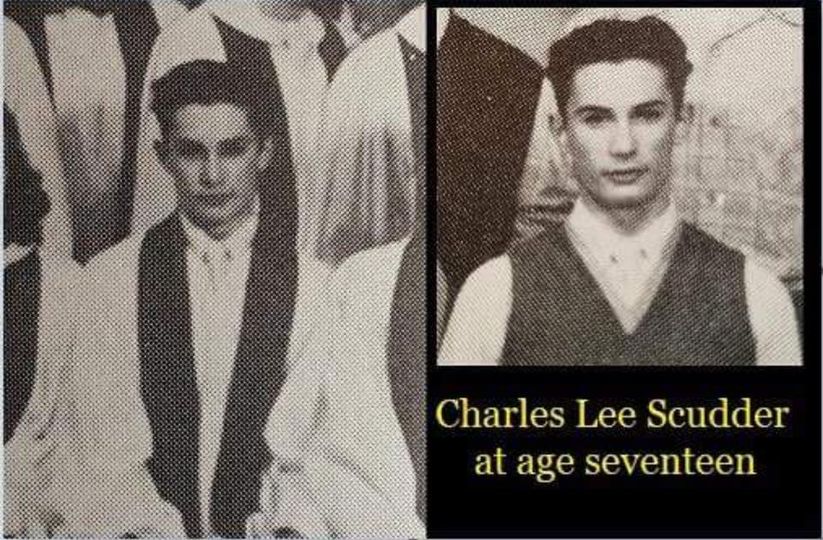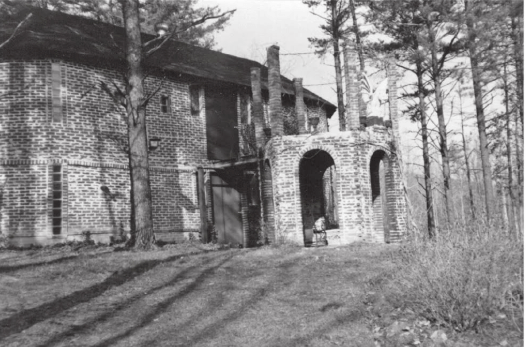
Dr. Charles Scudder, a professor of pharmacology at Chicago’s Loyola University, was often described as a “brilliant” and “polished” academic. Despite his comfortable life in a Chicago mansion, Scudder yearned for a simpler existence. Fed up with city life and the disintegration of his old neighborhood, he left behind his career, home, and most of his worldly possessions in 1976, seeking peace in the North Georgia woods.
Together with his partner Joe Odom, Scudder hand-built a residence they called Corpsewood Manor, named after the eerie, leafless trees that surrounded the area. The duo added a three-story “chicken house,” which housed more than just poultry. The first floor was for food storage, the second held canned goods and their pornography collection, and the third floor became their “pink room” or “pleasure chamber.” The pink room would soon gain notoriety as the setting for wild gatherings.
But Corpsewood Manor was more than a rustic retreat; it was also a reflection of Scudder’s unconventional beliefs. He was a member of the Church of Satan and had a profound interest in Gothic aesthetics and the occult. Scudder, a self-proclaimed atheist, didn’t worship Satan, but instead embraced the freedom and pleasures he felt the church offered in defiance of other religions.

Inside Corpsewood Manor: A Life of Rituals and Pleasure
When he left Loyola, Scudder took with him two human skulls and an impressive stash of 12,000 doses of LSD. He lived openly in Corpsewood Manor with Odom, their two mastiffs Beelzebub and Arsinath (named after a demon and an H.P. Lovecraft character), and his unconventional collection of Gothic relics. Corpsewood was adorned with a pink gargoyle, skulls, and a stained-glass window featuring Baphomet, a key figure in Satanist lore.
Despite its grim decorations, the couple’s life seemed tranquil and free-spirited. Scudder and Odom often hosted guests in their pink room, which was filled with mattresses, candles, and various paraphernalia. Guests were encouraged to indulge their desires amid a haze of sex and homemade wine.
A Fatal Night at Corpsewood
However, the free-spirited lifestyle of Scudder and Odom led to fatal consequences on the night of December 12, 1982. They had befriended locals Kenneth Avery Brock, 17, and his 30-year-old roommate Samuel Tony West. While the nature of their relationship is unclear, Brock had spent time at Corpsewood and perhaps felt exploited or simply believed the couple was wealthy. Convinced by West, the two decided to return to Corpsewood to rob Scudder and Odom.
Brock and West, accompanied by two teenagers, Joey Wells and Teresa Hudgins, arrived at Corpsewood Manor under the guise of friendship. After a few rounds of homemade wine and inhaling a chemical mixture, Brock retrieved a rifle from the car and shot Odom and the two dogs. They then demanded money from Scudder, unaware that the couple was not as wealthy as they had assumed.
Realizing there was nothing valuable to steal, Brock and West became enraged. They gagged and bound Scudder, who eerily muttered, “I asked for this,” before being shot five times in the head.
The Aftermath and Lingering Myths

After the murders, Brock and West fled to Mississippi, where they committed another killing during a robbery gone wrong. Days later, feeling remorseful, Brock turned himself in to police in Georgia, followed by West in Tennessee.
At the trial, West was sentenced to death for two counts of murder, while Brock received three consecutive life terms. Yet, despite the convictions, questions still remain. The trial revealed chilling details, including West’s declaration that Scudder and Odom were “devils,” and Brock’s claim that Scudder had somehow invited his own demise. Scudder’s eerie self-portrait, depicting himself gagged with bullet wounds, only fueled speculation about the events that transpired.
Over time, the Corpsewood Manor murders evolved into a myth surrounded by rumors of satanic rituals, wild sex parties, and drugs. Yet, some believe prejudice against the victims’ sexual orientation and religious beliefs played a key role in how their story was perceived and the public’s sensationalized understanding of the tragedy.
In Conclusion
The tragic events at Corpsewood Manor in 1982 remain a haunting chapter in Georgia’s history, mixing fact with legend. Dr. Charles Scudder’s retreat to a forest sanctuary ended not in peace, but in murder, leaving behind a story that is part cautionary tale, part mystery, and part dark folklore.


